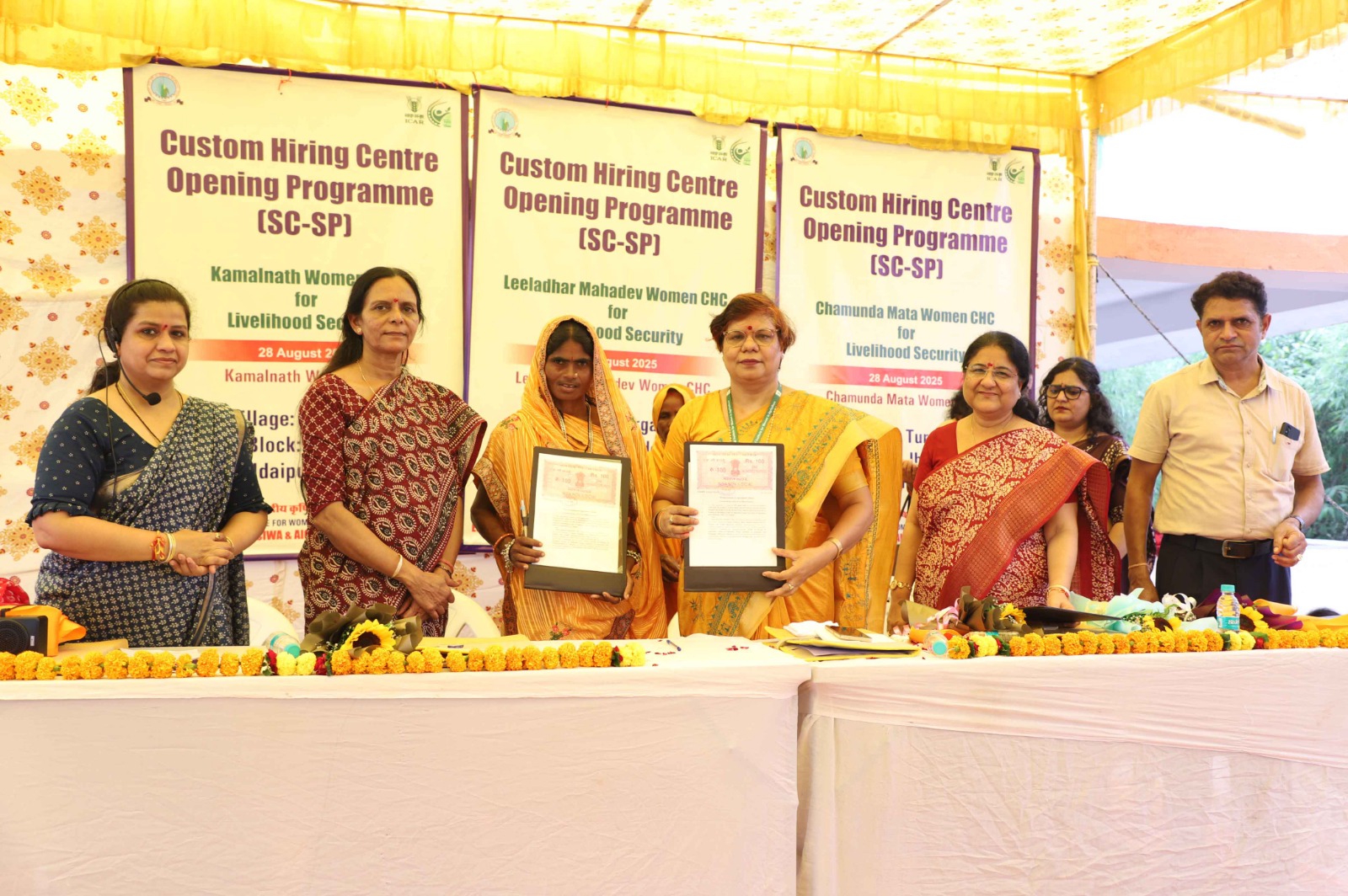
The inauguration was carried out by Dr. Mridula Devi, Director, AICRP-WIA, Bhubaneswar (Odisha); Dr. Dhriti Solanki, Dean, College of Community and Applied Sciences, Udaipur; Dr. Subhash Meena, Professor, Soil Science; and Prof. Rajshri Upadhyay, Extension Education and Communication Management. Nearly 450 women from 7–10 nearby villages, including Semli, Bhamti, Devdawas, Semari, Bichhiwara, Toorgarh, Thadiweri, and Panarwa, enthusiastically participated in the event.
Project In-charge and Unit Coordinator Dr. Vishakha Bansal highlighted that over the past two years, around 571 women beneficiaries from these villages were supported with agricultural and livestock-related equipment worth ₹7 lakh, including watering cans, weeders, tarpaulins, sprayer pumps, multipurpose saws, grain storage bins, milk cans, vermi-beds, sickles, azolla beds, buckets, and spades.
Additionally, five rainwater harvesting systems were installed in Jhadol village. In surrounding villages like Madar, Loyra, Brahmano ki Hundar, Feniya ka Guda, Thoor, and Gudli, items such as solar cookers (20), solar lights (20), improved storage bins (100), and mushroom bags (30) were distributed. The project also supported the “Har Ghar Sabzi, Har Ghar Poshan” campaign, distributing vegetable seed kits three times a year to promote nutrition.
To promote self-reliance, CHCs have been equipped with machinery worth nearly ₹10 lakh, including rice processing machines (2), pulse milling machine (1), solar dryers (2), flour mill (1), fodder cutting machines (3), grass-cutting machines (2), sewing machines (40), and threshers (2).
Speaking on the occasion, Dr. Dhriti Solanki emphasized that given the current socio-economic conditions, women’s self-reliance is crucial for strengthening both families and the nation. Dr. Mridula Devi encouraged women to acquire entrepreneurial skills to achieve self-sufficiency and assured that similar initiatives would continue. Training programs in tailoring, textile designing, beauty care, cooking and baking, computer literacy, handicrafts, and other vocational skills were highlighted as pathways for women’s empowerment.
Dr. Subhash Meena added that financial assistance, credit facilities, business guidance, and marketing support are essential to help women establish and sustain enterprises. He stressed that building confidence and creating supportive networks would ensure their success.
Prof. Rajshri Upadhyay remarked that educating women benefits entire families and that women’s contribution in agriculture and allied sectors significantly boosts economic growth.
A special skill development training program (25 August – 3 September 2025) on the design and development of protective clothing for women in agriculture was also launched at Toorgarh village, where 20 women are learning to create specialized protective garments.
During the ceremony, two booklets were released: “Labour-Intensive Tools for Farmers – Tribal Sub-Plan 2025–26” and “From Nutrition to Education for Children (0–6 years): Benefits and Recipes of Nutri-Cereals like Chena and Kangni.”
Under the National Agriculture Development Scheme (RKVY), Agriculture Department, Jaipur, beneficiaries from Jhadol Self-Help Groups were also provided with mushroom bags, vermicompost, and Sirohi breed goats.
Local volunteers Hiralal Patel and Nanalal Patel were felicitated for their continuous support. The vote of thanks was delivered by Dr. Vishakha Singh, Principal, Department of Food and Nutrition. The program was successfully coordinated by the project team including Dr. Sumitra Meena, Dr. Kusum Sharma, Dr. Vandana Joshi, Dr. Sneha Jain, Anushka Tiwari, Vikas Parmar, and Sujal Damor.